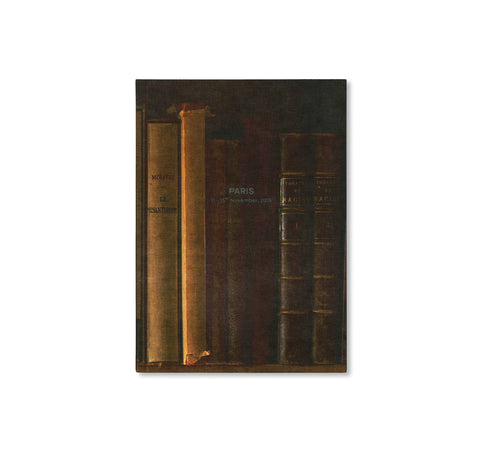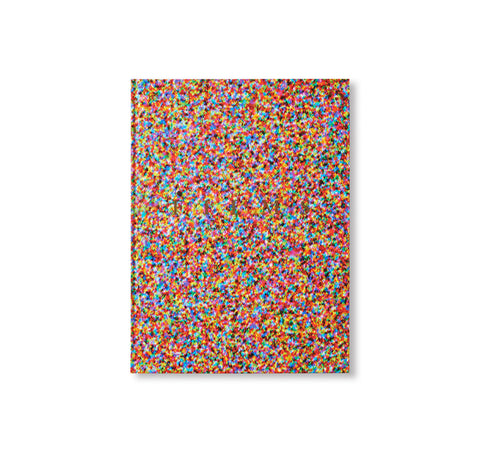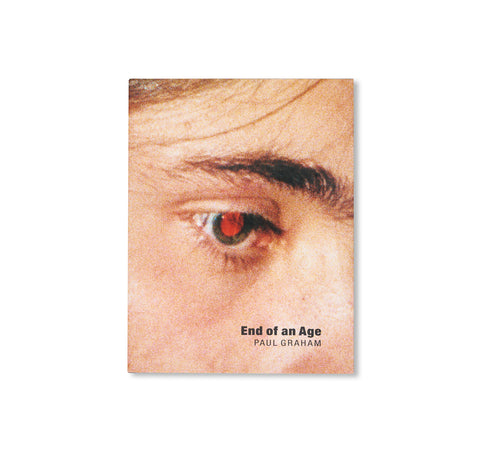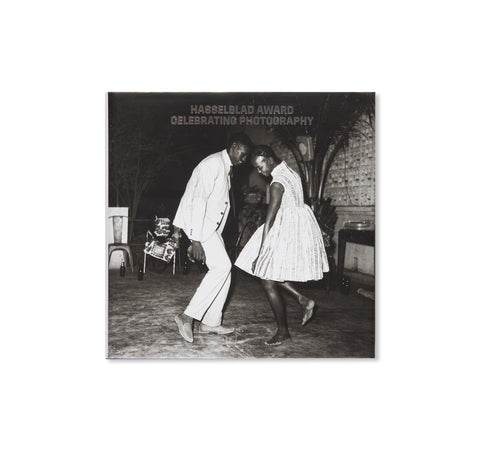MOTHER by Paul Graham [SIGNED]
イギリス人フォトグラファー、ポール・グラハム(Paul Graham)の作品集。印象派のホイッスラーから、フロイトの孫にして戦後ポートレイト画の代表であるルシアン・フロイド、セザンヌにホックニー、新古典主義の巨匠アングル、そしてゴーギャンと、芸術家が自分の母親を描くことは美術史の1つの伝統となっている。残酷なほど忠実に母親を描写したデューラーはこう述べている。「最も小さな皺や血管でさえも、決しておろそかにしてはならない。」ポール・グラハムにとって、2014年に発表した『DOES YELLOW RUN FOREVER?』以降最初の大きな作品となった本作『MOTHER』は、イギリスの養護施設に入居している年老いた母親が椅子に座っている姿を捉えたポートレイト・シリーズである。作者のカメラはほとんど動かない。どのイメージにも、目を閉じて眠る母親が写っている。花柄の花瓶、ピンクやラベンダー色のカーディガンなど、人生の終わりを思わせる優しい色彩が使われている。たった一つの窓から差し込む日の光は、柔らかく自然で、安定している。観る者を「楽しませる」ことに対し全く意識していないこの写真群を見ていると、片方の目からもう片方の目へ、ほどけた糸からボタンへ、そして少しだけ外側にはねているひと房の髪へと、慎重に選ばれたフォーカスが微妙に移り変わっていることにやがて気が付く。控えめなディテールを通じて、時間が静止したようなイメージの中に少しずつ衰えていく命の光が表現されている。そっと見つめている内に、激しい共感が沸き上がり、心が揺さぶられる。本作の主な主題は、人はいつか死ぬということ、人生の最期とはどういうことかをゆっくりと解き明かすことである。それだけでなく、イメージの核には二重性がある。生と死、そして子どもと親という役割の交代―見守られてきた者が今度は見守る側になり、創られた者が創る者になるのである。
記事:ポール・グラハム インタヴュー
写真が静かに描写する社会の盲点(IMA ONLINE)
Artists drawing or painting their mother has become iconic in art history—from Whistler through Freud, Cezanne, Hockney, Ingres, Gauguin or Durer, whose brutally honest portraits of his mother insisted that ‘Even the smallest wrinkles and veins must not be ignored’. Paul Graham’s first major body of work since 2014’s Does Yellow Run Forever? contains portraits of his elderly mother sitting in her chair in a retirement community in England. Graham’s camera hardly moves, with his mother asleep, eyes closed, in almost every image. Our palette is the gentle tones of old age—a flowered blouse, a pink or lavender cardigan—the light comes from a single daylight window, soft, natural and constant. With little attempt to photographically ‘entertain’ us, we begin to notice subtle shifts of carefully chosen focus, from one eye to another, to a loose thread on a button or a stray wisp of hair. Frozen in time, the fraying of life is expressed through modest details. Powerful emotional resonance arrives through tender observation. Mortality and the slow unraveling of late old age is the principal subject here, but there is also a duality at the core of these images: as we teeter between life and death, child and parent reverse roles—the watched-over becomes the watcher, the created becomes the creator.
![MOTHER by Paul Graham [SIGNED]](http://twelve-books.com/cdn/shop/products/mother01.jpg?v=1571704033)
![MOTHER by Paul Graham [SIGNED]](http://twelve-books.com/cdn/shop/products/mother02.jpg?v=1571704033)
![MOTHER by Paul Graham [SIGNED]](http://twelve-books.com/cdn/shop/products/mother03.jpg?v=1571704033)
![MOTHER by Paul Graham [SIGNED]](http://twelve-books.com/cdn/shop/products/mother04.jpg?v=1571704033)
![MOTHER by Paul Graham [SIGNED]](http://twelve-books.com/cdn/shop/products/mother07.jpg?v=1571704033)
![MOTHER by Paul Graham [SIGNED]](http://twelve-books.com/cdn/shop/products/mother08.jpg?v=1571704033)
![MOTHER by Paul Graham [SIGNED]](http://twelve-books.com/cdn/shop/products/mother09.jpg?v=1571704033)
![MOTHER by Paul Graham [SIGNED]](http://twelve-books.com/cdn/shop/products/mother10.jpg?v=1571704033)
![MOTHER by Paul Graham [SIGNED]](http://twelve-books.com/cdn/shop/products/mother11.jpg?v=1571704033)
![MOTHER by Paul Graham [SIGNED]](http://twelve-books.com/cdn/shop/products/mother12.jpg?v=1571704033)
![MOTHER by Paul Graham [SIGNED]](http://twelve-books.com/cdn/shop/products/mother13.jpg?v=1571704033)
![MOTHER by Paul Graham [SIGNED]](http://twelve-books.com/cdn/shop/products/mother14.jpg?v=1571704033)
![MOTHER by Paul Graham [SIGNED]](http://twelve-books.com/cdn/shop/products/mother15.jpg?v=1571704033)
![MOTHER by Paul Graham [SIGNED]](http://twelve-books.com/cdn/shop/products/mother16.jpg?v=1571704033)
![MOTHER by Paul Graham [SIGNED]](http://twelve-books.com/cdn/shop/products/mother17.jpg?v=1571704033)
![MOTHER by Paul Graham [SIGNED]](http://twelve-books.com/cdn/shop/products/mother18.jpg?v=1571704033)
![MOTHER by Paul Graham [SIGNED]](http://twelve-books.com/cdn/shop/products/mother19.jpg?v=1571704033)
![MOTHER by Paul Graham [SIGNED]](http://twelve-books.com/cdn/shop/products/mother20.jpg?v=1571704033)
![MOTHER by Paul Graham [SIGNED]](http://twelve-books.com/cdn/shop/products/mother05.jpg?v=1571704033)
![MOTHER by Paul Graham [SIGNED]](http://twelve-books.com/cdn/shop/products/mother06.jpg?v=1571704033)
![VERDIGRIS / AMBERGRIS by Paul Graham [SIGNED]](http://twelve-books.com/cdn/shop/files/02_d1eaa7e6-fa09-469b-8a09-f812642364f3_large.jpg?v=1719209981)
![TROUBLED LAND by Paul Graham [SIGNED]](http://twelve-books.com/cdn/shop/products/00_48740a43-29e5-48bf-a4f6-9dd396f0f1fb_large.jpg?v=1645245292)

![BEYOND CARING by Paul Graham [SIGNED]](http://twelve-books.com/cdn/shop/products/BeyondCaring01_32dabaa3-543a-49dd-8ebe-a640aa757e99_large.jpg?v=1623035860)
![A1 - THE GREAT NORTH ROAD by Paul Graham [FIRST EDITION, SECOND PRINTING]](http://twelve-books.com/cdn/shop/products/A100_f8fb86bc-4b86-4790-8d5c-2a8e31784a3b_large.jpg?v=1618903379)
![A1 - THE GREAT NORTH ROAD by Paul Graham [FIRST EDITION, SECOND PRINTING / SIGNED]](http://twelve-books.com/cdn/shop/products/A100_large.jpg?v=1599050414)

![A SHIMMER OF POSSIBILITY by Paul Graham [SIGNED]](http://twelve-books.com/cdn/shop/products/180410_7405_large.jpg?v=1571703965)



![DOES YELLOW RUN FOREVER? by Paul Graham [SIGNED]](http://twelve-books.com/cdn/shop/products/140818_0373_0d0733f7-2b6a-4343-b4db-4553d34a6ff4_large.jpg?v=1571703835)

![THE PRESENT by Paul Graham [SPECIAL EDITION]](http://twelve-books.com/cdn/shop/products/160324_4974_box_large.jpg?v=1571703838)


